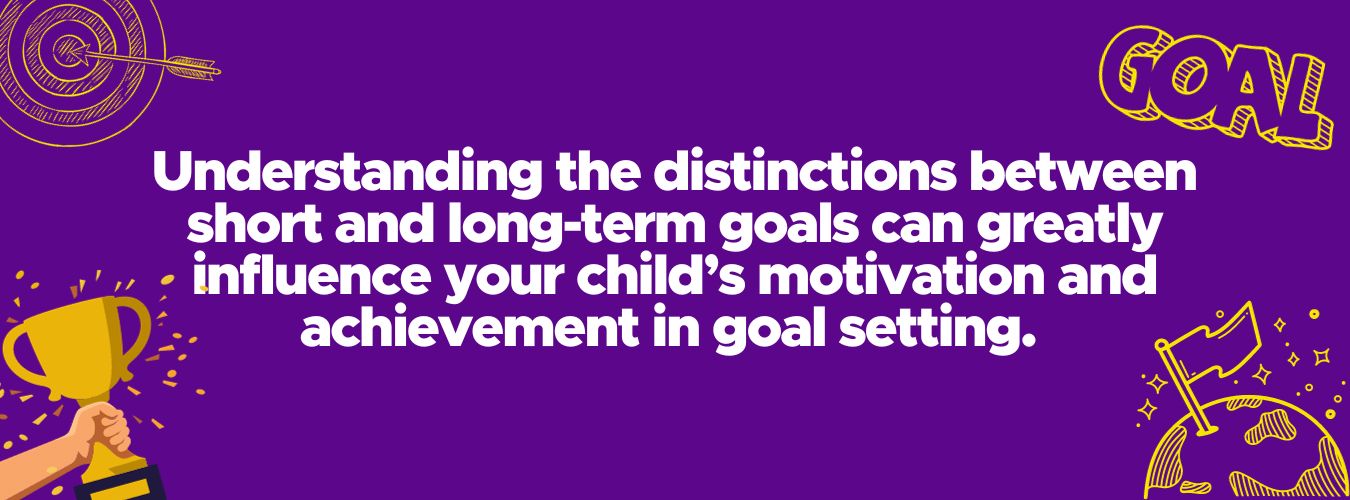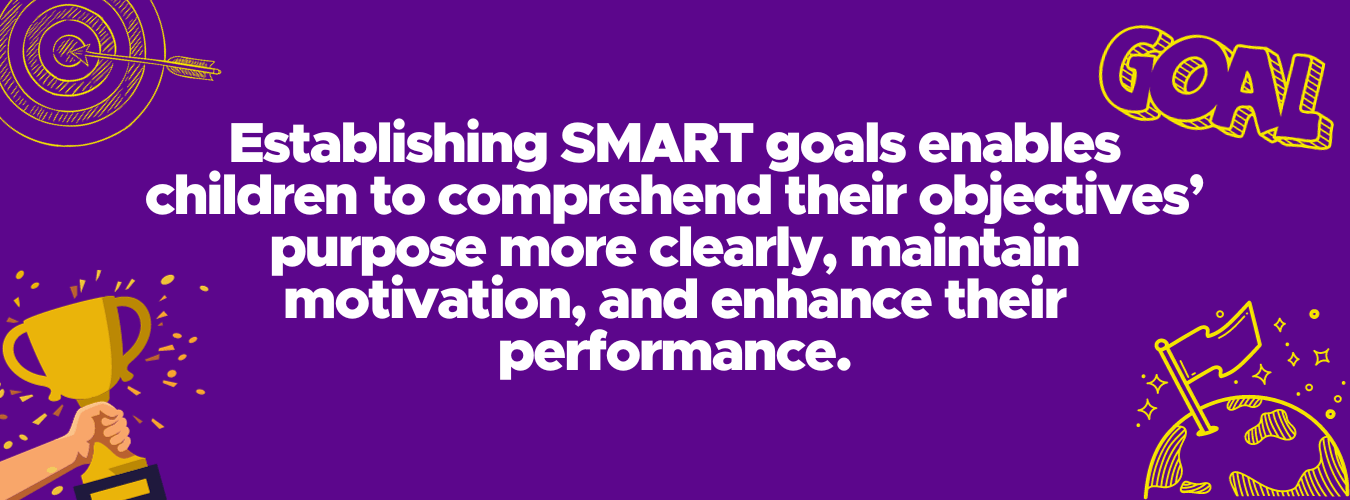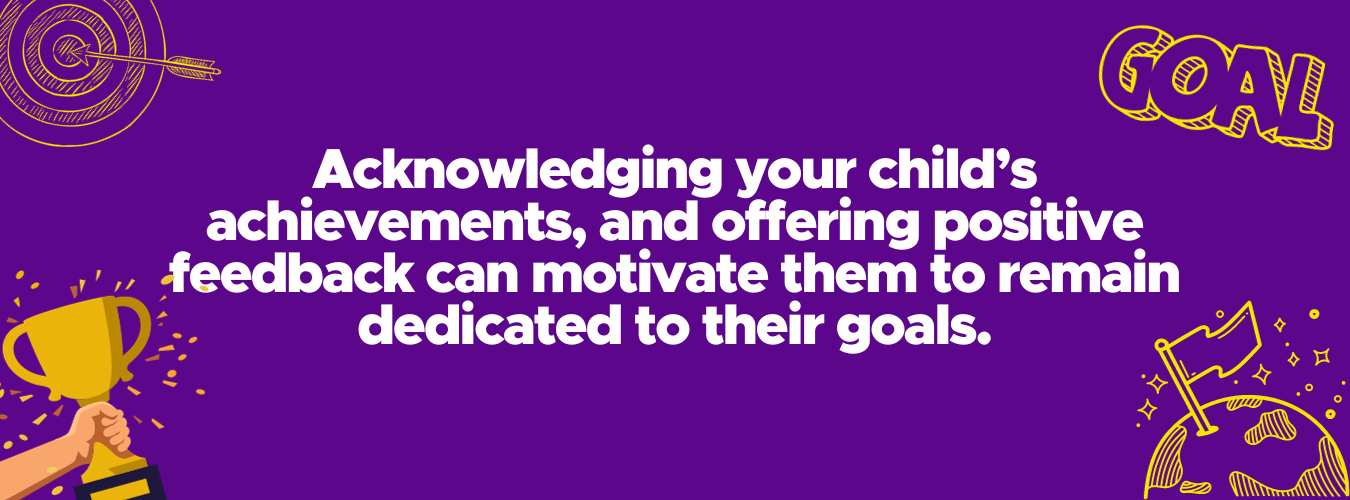Crafting Short and Long-Term Goals for Kids

Acquiring the skill of goal setting is pivotal for a child's development and success. It not only fuels their drive but also imparts vital life lessons.
In this blog post, we delve into the realm of goal setting for children, exploring the differences between short and long-term objectives, guiding them in setting SMART goals, fostering positive habits, and helping them sustain motivation and focus on these goals. It's an opportunity to empower your child, enabling them to unleash their full potential!
Is your child struggling to keep up with schoolwork? Are they falling behind? Are they bored in class? Or are you looking for extension work for your child? Check out our eBook to learn more about how we help your child improve academically and build confidence through our in-centre after-school tuition.
Understanding the Differences: Short and Long-Term Goals for Kids
Understanding the distinctions between short and long-term goals can profoundly affect your child's motivation and success in goal setting.
Short-term goals, attainable within weeks or months, provide a swift confidence boost and motivation. On the other hand, long-term goals require years of sustained dedication. By establishing both short and long-term goals, children can enjoy immediate success while striving for enduring and significant accomplishments.

Short-Term Goals
Establishing short-term goals for children can be empowering, boosting their confidence as these objectives can be accomplished within weeks or months. Motivating short-term goals might include saving for a toy, completing a school project, or learning a new skill.
These goals act as a pathway to success, enabling kids to break down their long-term ambitions into manageable steps.
Parents play a vital role in maintaining their children's enthusiasm and commitment to these short-term goals. Offering words of encouragement, setting an example through their actions, and monitoring progress can deeply impact a child's motivation to achieve their goals.
Long-Term Goals
Long-term goals represent ambitious aims requiring sustained effort and unwavering commitment to achieve. Establishing these goals provides children with a profound sense of purpose and direction, enabling them to maintain motivation and focus on their objectives.
Teaching Children How to Set SMART Goals
Teaching children how to establish SMART goals can significantly enhance their motivation and accomplishments. SMART goals, representing Specific, Measurable, Achievable, Relevant, and Time-based objectives, offer clear, focused, and easily traceable targets.
By following these criteria, children gain a deeper understanding of their goals' purpose, sustain motivation, and improve their performance.
The 'goal ladder' emerges as a valuable instrument for setting SMART goals, aiding in dividing a substantial, long-term objective into manageable short-term steps. This visualisation tool assists children in staying motivated and focused on refining and honing the skills required to achieve their overarching goal.

Specific
Motivating children to define clear objectives is essential for their success. Ambiguous goals lack the potency to spark change, while precise goals empower children to take necessary steps toward their desired results and fulfil their potential.
Measurable
Establishing measurable objectives is a cornerstone of the SMART goal-setting method. Measurable goals can be quantified or observed using specific criteria or metrics, making them exceptionally useful for tracking progress.
For instance, if your child wants to improve their math skills, setting a goal like "achieve a ten-point increase on my next math test" provides a precise measure of progress.
Measurable goals foster the cultivation of positive habits and recognise each accomplishment. Focusing on measurable objectives enables children to have a clearer grasp of their progress, adjust their efforts as necessary, and celebrate their achievements as they journey toward their goals.
Achievable
Another vital component of the SMART goal-setting framework is guaranteeing the realism and attainability of goals. Setting unrealistic objectives can lead to frustration and diminished motivation, whereas achievable goals enhance confidence and maintain motivation. To establish attainable goals, children should break down their major objectives into smaller, manageable tasks and focus on setting practical short-term goals.
Relevant
Establishing relevant objectives is essential for sustaining children's motivation and focus on their goals. Relevant goals are those that are meaningful to the child and align with their overall life aspirations.
By setting relevant goals, children can direct their energy toward what genuinely matters to them, cultivating a sense of purpose and direction in their pursuits.
Time-Based
Setting a deadline is a fundamental component of every SMART objective. Having a specific target date for a goal offers a clear timeframe to strive towards, helping children maintain their focus and motivation.
Breaking larger projects into smaller tasks, each with its deadline can further aid children in staying focused and motivated, ensuring steady progress towards their goals.
Supporting Your Child's Motivation and Focus
Helping your child maintain motivation and concentration on their goals is a crucial element of their development and achievements. Parents have a key role in fostering motivation by offering encouragement, setting positive examples, and monitoring their child's progress.
Acknowledging your child's accomplishments, providing positive feedback, and leading through your actions can inspire them to stay focused and committed to their goals.
Regularly evaluating their objectives and discussing challenges or successes they encounter along the way can further support them in staying on track and sustaining their motivation.

Positive Reinforcement and Support
Providing encouragement and praise has a significant impact on your child's motivation and self-confidence. Recognising their efforts and celebrating their achievements can enhance their confidence and inspire them to persist in pursuing their goals.
For instance, if your child is working towards making new friends, offering words of encouragement and acknowledging their progress can boost their confidence in social situations. This positive reinforcement acts as a driving force, encouraging them to continue their efforts and develop lasting friendships.
Leading by Example
Parents can promote positivity by:
- Setting and accomplishing their own goals, showcasing the significance of goal-setting.
- Being role models.
- Demonstrating positive qualities and behaviours.
These actions are crucial in inspiring and motivating your child to establish and achieve their goals.
For example, if your fitness goal includes regular exercise, sharing your progress with your child can inspire them to set their fitness objectives. This not only encourages them to pursue their fitness ambitions but also fosters a sense of commitment and determination to achieve their goals.
Progress Tracking
Monitoring your child's progress is essential for evaluating their development and making necessary adjustments. It ensures their accountability and motivates them to stay on track. Regularly reviewing your child's goals helps them maintain focus and provides opportunities to celebrate their achievements.
Consider another scenario: if your child aims to improve their math skills, scheduling weekly check-ins to assess their progress can keep them motivated and focused on their goal. These check-ins also offer chances to address challenges together and brainstorm potential solutions, fostering a collaborative and supportive environment.
Setting personal growth goals equips your child with problem-solving skills, enabling them to make well-informed decisions based on evidence and reasoning. Pursuing these objectives establishes a strong foundation for critical thinking and personal development, enriching their skills for a lifetime.
![]()
Goal setting profoundly impacts a child's growth and success. Understanding the distinctions between short and long-term goals, teaching children to set SMART goals, cultivating positive habits, and supporting their focus and motivation empower them to reach their full potential. It's time to inspire your child to set and achieve their goals, unlocking their true capabilities and guiding them toward a bright and successful future.
At NumberWorks'nWords, we assist our students in establishing both short and long-term goals, ensuring they are on the right path to achieve them. Our effective math and English tutoring approach not only helps children build foundational skills and bridge learning gaps but also enhances their confidence in learning. To learn more about our tutoring programmes, contact your local centre and schedule a free assessment today!




